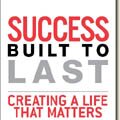Academia

What makes people and their organizations built to last enduring success for decades? This project found the answer.
The Stanford-based team that wrote the world-renown book for business, "Success Built to Last," (by Jerry Porras, Mark Thompson and Stewart Emery) in conjunction with Wharton Business Press and Prentice Hall, conducted a ten year research project of people who had achieved success in their fields for 20 years or more. The team discovered that the traditional definition of success, namely money, fame, and power no longer accurately describes how high achievers maintain success for decades.
The team then leveraged IdeaMap.Net to test if those key principles that were found among enduringly successful respondents transcends to a larger population set across the world. The survey was launched in the Spring of 2006 among readers of "," an online publication circulated to senior and mid-level managers, educators and other professionals in 100 countries. More than 350 responses were collected within the first week.
The results of the study confirmed the new underlying principles of success that the team found. The following attributes and statements were most common amongst the respondents:
- Successful people don`t rely on the approval of others to pursue their cause or calling.
- They have the audacity to take the initiative despite social pressures rather than because of them.
- They are more emotionally committed to doing what they love than being loved by others.
- They don`t wallow or obsess on a single defeat or rely on finding scapegoats or blame when things go wrong, but instead relentlessly place highest priority on being effective in getting the outcomes they are seeking.
Most importantly, the team identified three essential segments in the population that behaved and acted on those principles in very different ways:
1) Meaning-44% of the population identify strongest with making a difference` and setting big goals to achieve that.
2) ThoughtStyle-29% of the population are committed most to following their passions and striving for the right balance.
3) ActionStyle-27% of the population loves achieving goals and loving their work.
The study yielded ingenious ways to enable executives and organizations to assess and optimize their performance and skills around these three simple dimensions (details at www.SuccessBuiltToLast.com). The IdeaMap.Net proprietary attitudinal segmentation program also quantitatively validated the intuitive subgroups which were expected to emerge from the survey. These findings will be published in the next version of "Success Built to Last," in 2006. IdeaMap.Net technology continues to identify paradigm-breaking views within the business world.











